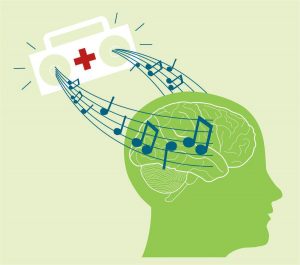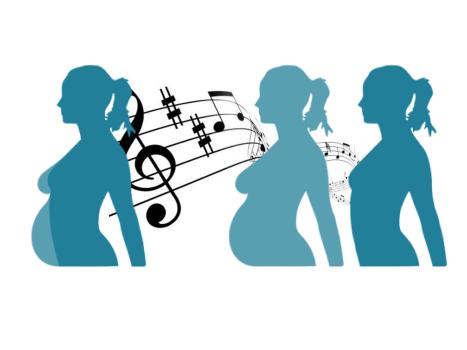Music Therapy and the Brain:
There are countless ways in which the listening, singing, or performing music promote positive chemical alterations in the brain. Coupled with traditional forms of treatment (e.g. medication, psychotherapy), music therapy can activate reward and motivation regions of the brain, suggesting music’s ability to modulate emotional and cognitive functioning. Listening to music has also shown to participate in management of stress and anxiety, as relaxing music has been shown to decrease cortisol levels and promote relaxation and lowered stress. Musical activities have also been shown to increase levels of the hormone oxytocin, suggesting that music plays a role in facilitating social interactions, and, as described later, childbirth. 
From mood regulation to pain management, music therapy can therefore be utilized in a variety of clinical and nonclincal settings in order to provide both physiological and psychological benefits to pregnant individuals in the prenatal, perinatal, and postnatal phases of pregnancy and childbirth.
Prenatal Music Therapy:
Prenatal: the time period that begins at the time of conception and ends at 22 weeks gestation
Music therapy during the prenatal stage of pregnancy primarily targets the mother’s emotional and physical symptoms that accompany this phase pregnancy.
- Listening to the music of the mother’s choice has shown to result in overall decreases in prenatal anxiety and stress.
- Music listening can aid with emotional regulation, as mood swings can be a significant challenge due to extreme alterations in hormone levels throughout pregnancy.
- Music therapy can be used to promote relaxation and pain relief, a useful aspect during the prenatal period in which there is rapid weight gain and tension due to stress that results in lower back pain and body aches.
- Prenatal music classes often involve singing lullabies to the fetus, further reducing maternal stress and encouraging infant attachment and bonding
Perinatal Music Therapy:
Perinatal: the period of time that spans from 22 weeks gestation to 7 days postpartum
Music therapy during the perinatal phase of pregnancy is aimed at alleviating stress, anxiety, and pain right before and during labor.
- Preeclampsia is a condition in which the mother experiences abnormally high blood pressure during pregnancy, leading to potential complications during childbirth for both the mother and the fetus. Listening to relaxation-promoting music can lower blood pressure, indicating an additional potential treatment for preeclampsia.
- Music therapy helps to reduce stress and anxiety levels during labor, allowing for potential increased comfort throughout childbirth.

- There is a key positive feedback mechanism that occurs during childbirth, in which oxytocin, produced by the hypothalamus and released by the posterior pituitary gland, promotes uterine contractions. These contractions then stimulate the release of oxytocin, establishing this amplification cascade that continues until the infant is born. Music therapy during labor has been shown to not only increase tolerance to pain, but also stimulate release of oxytocin that increases uterus activity and consequently shortens the duration of labor.
Postnatal Music Therapy:
Postnatal: the period of time that continues after 7 days postpartum
Music therapy during this stage is primarily focused on alleviation of postpartum depression and anxiety symptoms. When coupled with other forms of treatment (e.g. medication, psychotherapy), this form of therapy can help to reduce the severity of postpartum psychological complications, promoting greater wellbeing and emotional satisfaction for the mother.
Why is this research important for both the mother and the infant?
As demonstrated above, music therapy can provide significant benefits for the physical and emotional wellbeing of mother. In additon to these advantages, music therapy can reduce overall maternal stress throughout the duration of the pregnancy, allowing for a potential reduction in the following risks for the child associated with maternal stress:
- Preterm birth
- Low birth weight
- Congenital heart defects
- Asthma
- Depression
- Cognitive deficits/ developmental delays
As research continues to emerge regarding the potential benefits of music therapy, more aspects of female reproductive health and pregnancy may indeed see music therapy become an integral component of pain management and overall wellbeing of individuals.
